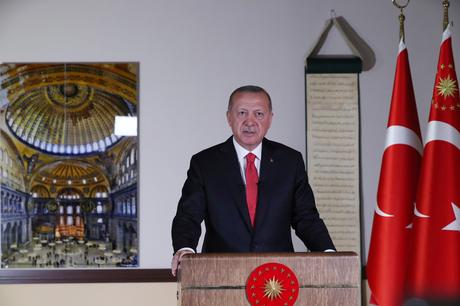(Istanbul) Turkish President Recep Tayyip Erdogan rejected on Saturday the international condemnation of the transformation of the Hagia Sophia in Istanbul into a mosque, arguing that it was "sovereign rights" of his country.
"Those who do not stumble against Islamophobia in their own countries [...] attack the will of Turkey to use its sovereign rights", said Erdogan during a videoconference ceremony .
"We made this decision not in relation to what others say, but in relation to our rights, as we have done in Syria, Libya and elsewhere," he added. .
The Council of State, the highest administrative court in Turkey, acceded to the request of several associations on Friday by revoking a government measure of 1934 giving Sainte-Sophie the status of a museum.
Shortly after, Mr. Erdogan announced that the former Byzantine basilica of the former Constantinople would be open to Muslim prayers as a mosque on Friday 22 July.

PHOTO PROVIDED BY THE OFFICE OF THE PRESIDENT VIA REUTERS
Turkish President Recep Tayyip Erdogan
A major architectural work built in the 6th century by the Byzantines who crowned their emperors there, Hagia Sophia is a UNESCO World Heritage Site, and one of the main tourist attractions in Istanbul with some 3 , 8 million visitors in 2019.
Converted into a mosque after the capture of Constantinople by the Ottomans in 1453, it was transformed into a museum by 1934 by the leader of the young Turkish Republic, Mustafa Kemal, anxious to "offer it to humanity ".
Several countries, notably Russia and Greece, which closely follow the fate of the Byzantine heritage in Turkey, as well as the United States and France, had in particular warned Ankara against the transformation of Hagia Sophia in Muslim places of worship, a measure for which Mr. Erdogan, from an Islamoconservative party, has campaigned for years.
" Provocation "
Reactions were not long in coming: Athens condemned the decision "with the greatest firmness", Washington said it was "disappointed" and Paris "deplored" it. Greece, through the voice of its Minister of Culture Lina Mendoni, considered that it was a "provocation towards the civilized world": "The nationalism shown by President Erdogan brings his country back six centuries "
The Russian Orthodox Church regretted that the "concern" of "millions of Christians" had not been heard by the Turkish court.
The World Council of Churches, which brings together approximately 350 Christian churches, especially Protestant and Orthodox, expressed his "sorrow" and his "dismay".
Since the coming to power in 2003 of Mr. Erdogan, activities related to Islam have multiplied inside Hagia Sophia, with in particular sessions to read the Koran or collective prayers on the square in front of the monument.
On Saturday, the basilica was closed, the police having installed barriers around the monument. "We wanted to [...] visit the Hagia Sophia museum, unfortunately we realized that it is closed from today," replied Renato Daeo, an Italian tourist.
Accompanied by her daughter 16 months and of her husband, Ksennia Bessonova, Russian living in Turkey, suffered the same disappointment: "It was our little dream because since the birth of our daughter, we had not been able to come (visit the basilica), in a sense I sad sense ".
Even if a reconversion of Hagia Sophia into a mosque will not prevent tourists of all beliefs from going there - many of them visit the nearby Blue Mosque every day -, it was foreseeable that modifying the The status of such an emblematic place in the history of Christianity has raised tensions abroad.
But Erdogan, nostalgic for the Ottoman Empire, is today seeking to rally the conservative electorate amid economic crisis due to the pandemic of new coronavirus and a difficult regional context.
"It's a decision I've been waiting for for years. It's a shame it hasn't happened before, that's why I'm very happy, "said Istanbul resident Umut Cagri on Friday.
Ozgur Unluhisarcikli, director of the Ankara office of the organization German Marshall Fund, also noted on Saturday to AFP that this decision could earn Mr. Erdogan the support of many of his compatriots " for religious and nationalist feelings [...] It is a debate that President Erdogan cannot lose and that the opposition cannot win ".

